PHP developers are the backbone of server-side web development. They are responsible for writing the logic that powers your web applications, ensuring that data is processed correctly and efficiently.
PHP development skills include proficiency in the PHP language, understanding of databases like MySQL, and familiarity with frameworks such as Laravel. Additionally, skills like debugging, problem-solving, and effective communication are crucial for success in this role.
Candidates can write these abilities in their resumes, but you can’t verify them without on-the-job PHP Developer skill tests.
In this post, we will explore 9 essential PHP Developer skills, 10 secondary skills and how to assess them so you can make informed hiring decisions.
Table of contents
9 fundamental PHP Developer skills and traits
The best skills for PHP Developers include PHP Proficiency, Object-Oriented Programming, Database Management, HTML/CSS, JavaScript, Version Control, Framework Knowledge, API Integration and Security Best Practices.
Let’s dive into the details by examining the 9 essential skills of a PHP Developer.
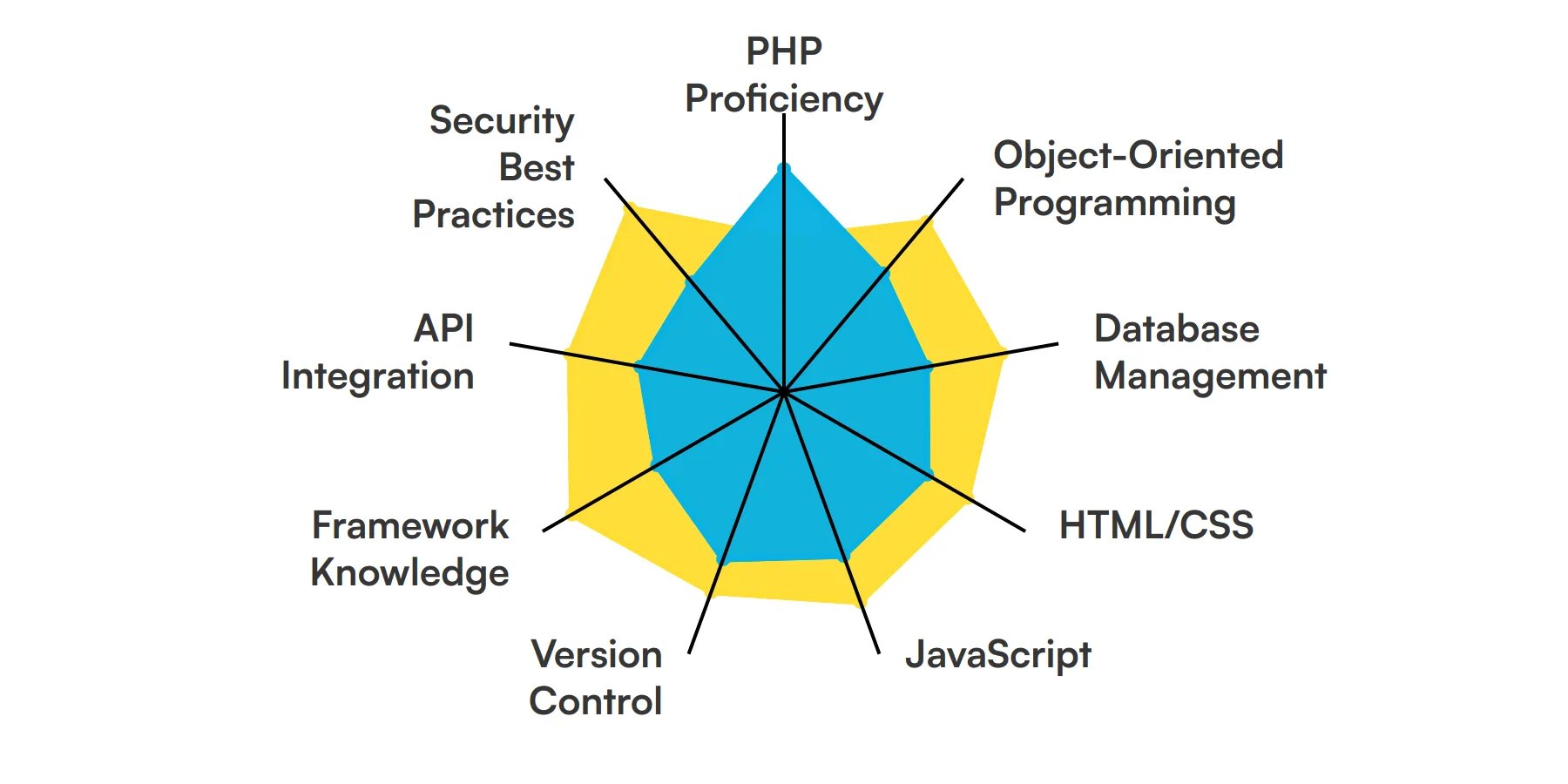
PHP Proficiency
A PHP developer must have a strong grasp of PHP syntax and functions. This skill is fundamental for writing, testing, and maintaining code that powers web applications.
For more insights, check out our guide to writing a PHP developer Job Description.
Object-Oriented Programming
Understanding OOP principles is crucial for PHP developers. It allows them to create modular, reusable, and maintainable code, which is essential for large-scale applications.
Database Management
Knowledge of SQL and experience with databases like MySQL or PostgreSQL is necessary. PHP developers use this skill to design, query, and manage databases efficiently.
HTML/CSS
A PHP developer should be proficient in HTML and CSS to create and style web pages. This skill helps in integrating backend logic with frontend design seamlessly.
JavaScript
Familiarity with JavaScript is important for PHP developers to handle client-side scripting. This skill is used to enhance user interactions and create dynamic web pages.
Check out our guide for a comprehensive list of interview questions.
Version Control
Experience with version control systems like Git is essential. PHP developers use this skill to track changes, collaborate with team members, and manage code versions.
Framework Knowledge
Understanding popular PHP frameworks like Laravel or Symfony is beneficial. These frameworks provide tools and libraries that streamline development and improve code quality.
For more insights, check out our guide to writing a Laravel developer Job Description.
API Integration
PHP developers often need to integrate third-party APIs. This skill involves understanding how to connect and interact with external services to extend application functionality.
Security Best Practices
Knowledge of security practices is crucial for PHP developers. This includes understanding how to protect applications from common vulnerabilities like SQL injection and XSS.
Check out our guide for a comprehensive list of interview questions.
10 secondary PHP Developer skills and traits
The best skills for PHP Developers include Linux/Unix, Testing/Debugging, RESTful Services, Composer, Command Line Interface, Caching Techniques, Cloud Services, Docker, WebSockets and GraphQL.
Let’s dive into the details by examining the 10 secondary skills of a PHP Developer.
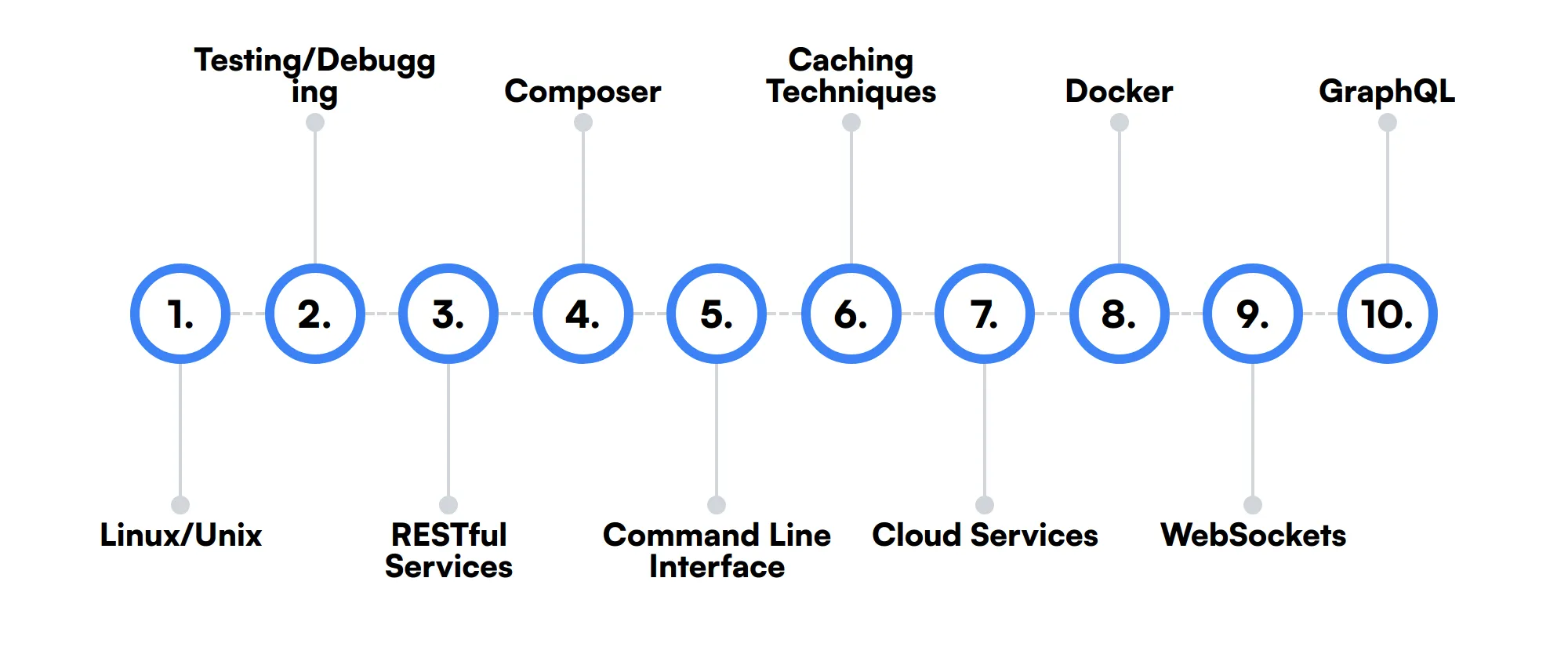
Linux/Unix
Familiarity with Linux or Unix systems can be beneficial. PHP developers often work on servers running these operating systems, so basic command-line skills are useful.
Testing/Debugging
Skills in testing and debugging are important for ensuring code quality. PHP developers use tools like PHPUnit to write tests and debug issues effectively.
RESTful Services
Understanding RESTful services is useful for PHP developers. This skill helps in designing and consuming REST APIs, which are common in modern web applications.
Composer
Knowledge of Composer, the dependency manager for PHP, is helpful. PHP developers use Composer to manage project dependencies and libraries efficiently.
Command Line Interface
Basic CLI skills can be advantageous. PHP developers often use the command line for tasks like running scripts, managing files, and deploying applications.
Caching Techniques
Understanding caching techniques can improve application performance. PHP developers use tools like Memcached or Redis to cache data and reduce server load.
Cloud Services
Familiarity with cloud services like AWS or Azure can be a plus. PHP developers may need to deploy and manage applications on cloud platforms.
Docker
Knowledge of Docker can be beneficial for PHP developers. Docker allows them to create containerized environments, making development and deployment more consistent.
WebSockets
Understanding WebSockets can be useful for real-time applications. PHP developers use WebSockets to enable two-way communication between the server and clients.
GraphQL
Familiarity with GraphQL can be an advantage. PHP developers use GraphQL to create flexible and efficient APIs that allow clients to request exactly the data they need.
How to assess PHP Developer skills and traits
Assessing the skills and traits of a PHP developer involves more than just glancing at their resume. While a resume might highlight their experience with PHP, Object-Oriented Programming, and other technical skills, it doesn't provide a clear picture of their hands-on coding ability or problem-solving skills.
To truly understand whether a candidate will excel in a PHP role, you need a method that evaluates their practical skills in areas like Database Management, HTML/CSS, JavaScript, and more. Using skill assessments is a proven way to measure these abilities accurately.
For instance, Adaface offers tailored assessments that can help you evaluate a PHP developer's proficiency across essential skills such as Framework Knowledge, API Integration, and Security Best Practices. By incorporating these tests into your hiring process, you can achieve a 2x improvement in the quality of your hires and significantly cut down on screening time.
Let’s look at how to assess PHP Developer skills with these 5 talent assessments.
PHP Online Test
Our PHP Online Test evaluates a candidate's proficiency in PHP, covering fundamental concepts, object-oriented programming, and error handling.
The test assesses their understanding of PHP fundamentals, OOPs, built-in and custom functions, sessions, error and exception handling, and database handling. It includes scenario-based MCQs and coding questions to evaluate hands-on PHP programming skills.
Successful candidates demonstrate a strong grasp of structuring PHP code, handling server-side caching, and managing databases effectively.
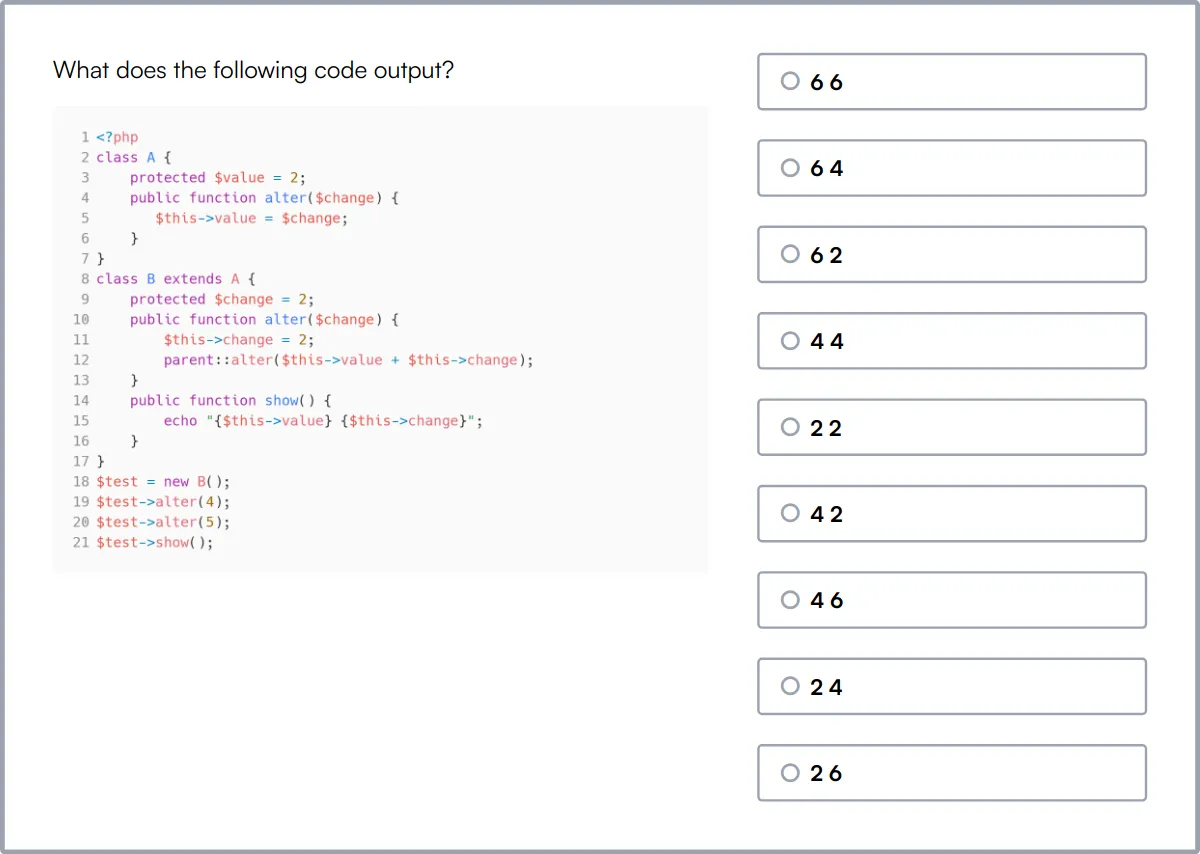
MySQL Online Test
Our MySQL Online Test evaluates a candidate's proficiency in using MySQL, including SQL queries, database design, and data manipulation.
The test assesses their knowledge of SQL queries, database design, normalization, indexing, transactions, and stored procedures. It uses scenario-based MCQs to evaluate their ability to work with MySQL databases and manage data.
High-scoring candidates demonstrate strong skills in creating efficient queries, designing normalized databases, and managing complex transactions.

HTML/ CSS Online Test
Our HTML/ CSS Online Test evaluates a candidate's ability to create and style web pages using HTML and CSS.
The test covers core HTML tags, handling forms, CSS box model, styling elements, Flexbox and Grid layouts, responsive design, working with images, custom fonts, and CSS animations. It includes scenario-based MCQs and simple coding questions.
Successful candidates have a strong understanding of CSS layout techniques, responsiveness, and browser compatibility.
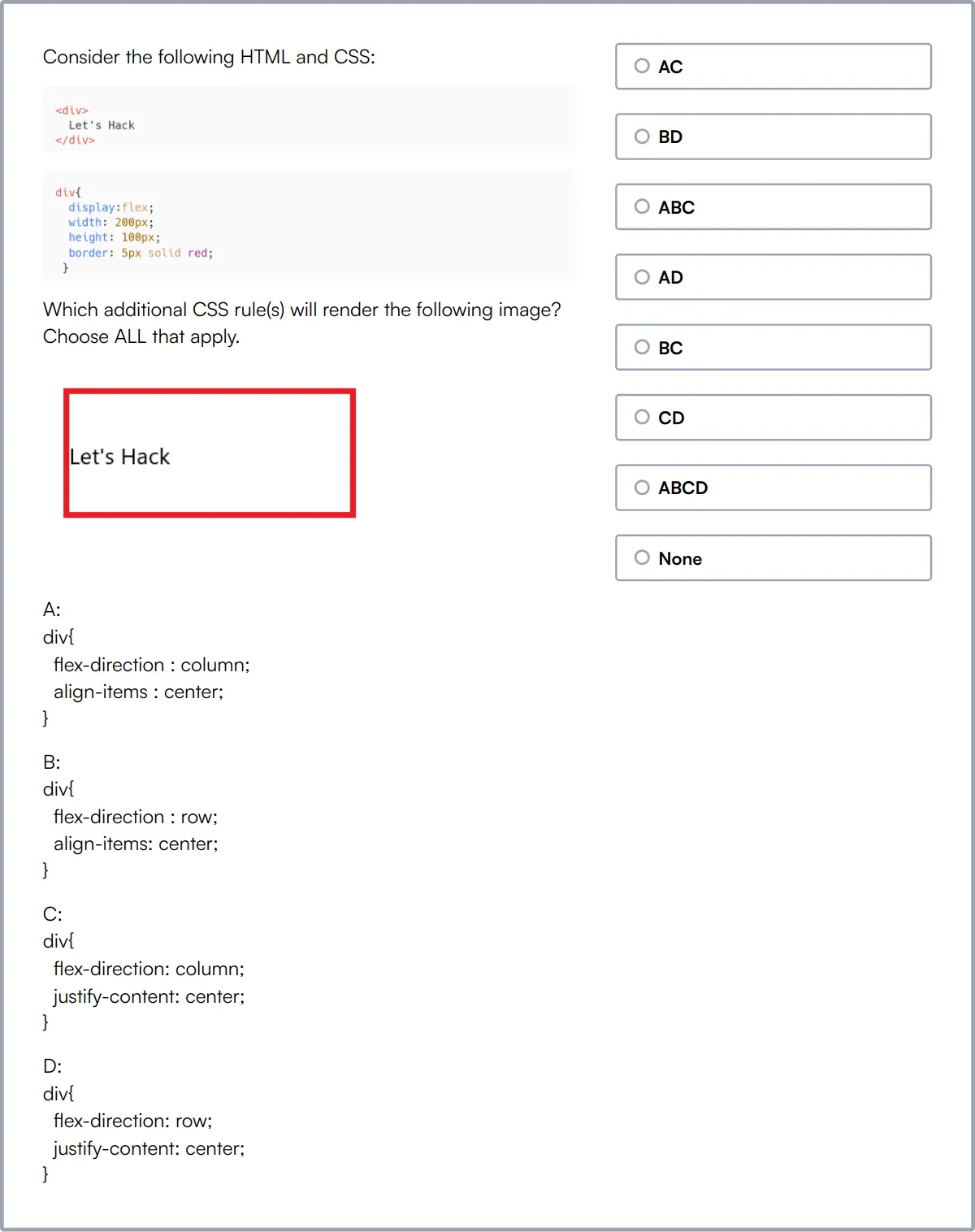
JavaScript Online Test
Our JavaScript Online Test evaluates a candidate's proficiency in JavaScript, covering fundamental concepts and advanced features.
The test assesses their knowledge of JavaScript basics, DOM manipulation, error handling, working with JSON, ES6 features, higher-order functions, OOP, asynchronous programming, and handling APIs. It includes scenario-based MCQs and coding questions.
Candidates who perform well demonstrate strong skills in both synchronous and asynchronous JavaScript programming, as well as proficiency in modern JavaScript features.
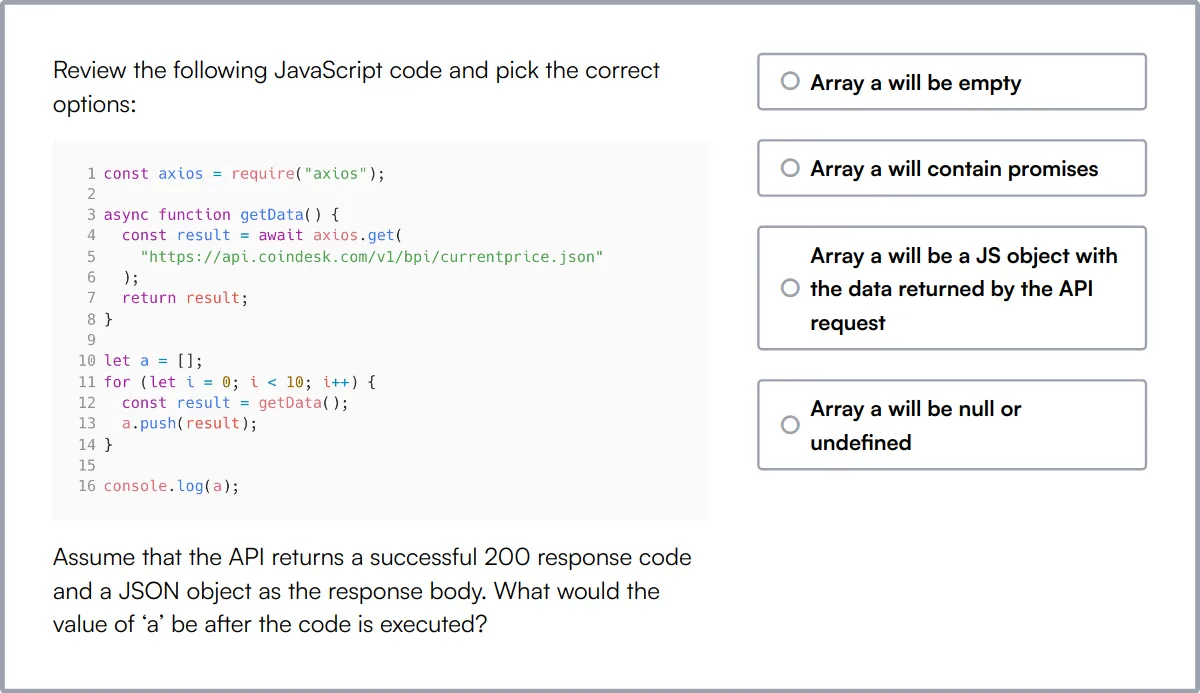
Git Online Test
Our Git Online Test evaluates a candidate's understanding of Git, a popular version control system.
The test covers Git basics, repository creation, branching and merging, committing changes, conflict resolution, remote repositories, rebasing, Git workflows, Git commands and concepts, and branching models. It uses scenario-based MCQs.
High-scoring candidates show proficiency in managing source code, resolving conflicts, and using advanced Git commands and workflows.
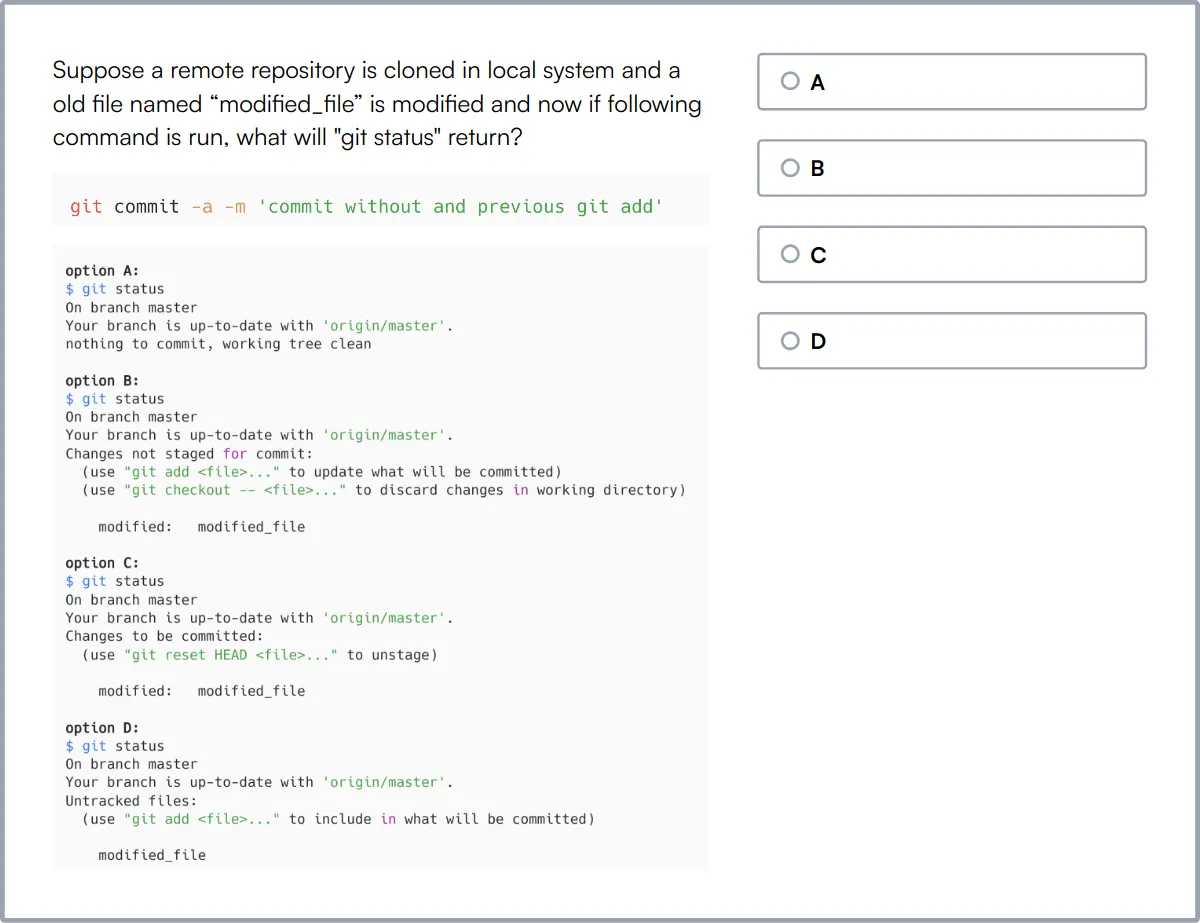
Summary: The 9 key PHP Developer skills and how to test for them
| PHP Developer skill | How to assess them |
|---|---|
| 1. PHP Proficiency | Evaluate the developer's ability to write clean, efficient PHP code. |
| 2. Object-Oriented Programming | Assess understanding of OOP principles and their application in PHP. |
| 3. Database Management | Check skills in designing, querying, and managing databases. |
| 4. HTML/CSS | Gauge how a developer creates a well-structured, user-friendly interface. |
| 5. JavaScript | Assess a developer’s skills in creating interactive, dynamic designs. |
| 6. Version Control | Evaluate proficiency in using Git for code versioning and collaboration. |
| 7. Framework Knowledge | Determine familiarity with PHP frameworks like Laravel or Symfony. |
| 8. API Integration | Check ability to integrate and work with various APIs. |
| 9. Security Best Practices | Assess knowledge of securing web applications against vulnerabilities. |
PHP Online Test
PHP Developer skills FAQs
What are the key PHP skills a developer should have for a successful career?
A PHP developer should be proficient in PHP, understand object-oriented programming, and have experience with database management. Knowledge of HTML/CSS, JavaScript, and popular PHP frameworks like Laravel or Symfony is also important.
How can recruiters assess a candidate's proficiency in PHP during an interview?
Recruiters can assess PHP proficiency by asking candidates to solve real-world coding problems, review code samples, or discuss past projects. Additionally, asking about their experience with PHP frameworks and APIs can provide insight into their expertise.
What is the importance of understanding database management in PHP development?
Database management is crucial for PHP developers as most web applications interact with databases. Skills in SQL and experience with MySQL, PostgreSQL, or other databases ensure developers can handle data efficiently and securely.
Why is knowledge of version control important for PHP developers?
Version control systems like Git help PHP developers manage changes to the codebase, collaborate with others, and maintain a history of project evolution. This is key for team collaboration and effective project management.
How do RESTful services and API integration enhance PHP development?
RESTful services and API integration allow PHP developers to connect and interact with other web services and applications. This expands the functionality of PHP applications and enables them to leverage external data and services.
What are some security best practices PHP developers should follow?
PHP developers should implement security measures like using prepared statements for database access, validating and sanitizing user inputs, and employing HTTPS. Regular security updates and following OWASP guidelines are also recommended.
Can you explain the role of Docker in PHP development?
Docker provides a standardized environment for developing, testing, and deploying PHP applications. It isolates the application from the underlying system, ensuring consistency across different development and production environments.
What benefits do cloud services offer to PHP developers?
Cloud services offer scalability, reliability, and flexibility, allowing PHP applications to handle varying loads and data volumes efficiently. They also provide advanced tools for monitoring, analytics, and automated backups.

40 min skill tests.
No trick questions.
Accurate shortlisting.
We make it easy for you to find the best candidates in your pipeline with a 40 min skills test.
Try for freeRelated posts
Free resources



